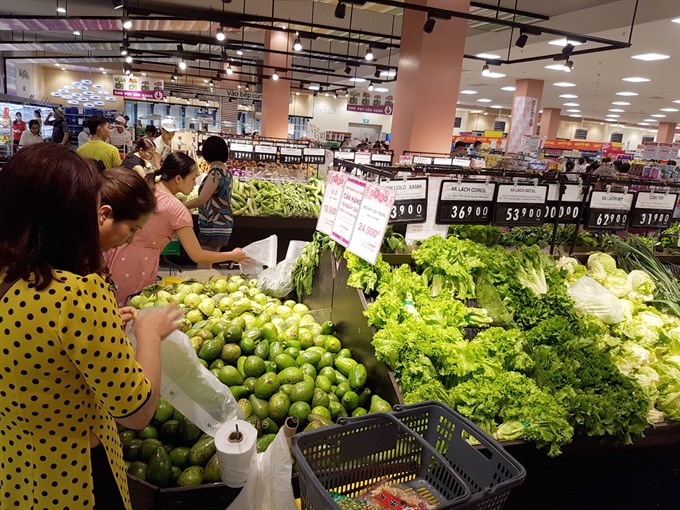 Economy
Economy

As one of the country’s few reliable, medium-term distribution channels, competitions to nab a spot on the supermarkets’ shelf among Vietnamese consumables manufacturers are fierce game, while these distributors consider it fair fight.
 |
| Shoppers at the fresh vegetables section of a supermarket in Hà Nội. — VNS Photo Thái Hà |
HÀ NỘI — Small and medium sized firms are being crushed and elbowed out in the increasingly fierce competition to become a supermarket supplier.
This has sparked accusations of unfair purchase policies and the counter response that supermarkets make rational buying decisions and are willing to help producers and distributors.
With supermarkets occupying an increasing share of the retail market, supplying consumer goods to this channel has become more important.
Ngô Đức Sinh, chairman of Hòa Bình Province’s Kim Bôi Agriculture and Forestry Products JSC, told the Public Security News (Công An Nhân Dân) newspaper, official information channel of the Ministry of Public Security, that there seemed to be no uniformity or reliability in assessing goods and choosing suppliers.
Speaking at a networking event organised by the HCM City’s Department of Industry and Trade, Sinh said that, having his company’s products present in most major supermarkets and convenience stores, he saw that the same product was welcomed by one and rejected by another.
However, Hồ Quốc Nguyên, Big C Vietnam’s head of Public Relations, said as quoted by the paper that supermarkets understand the relationship between producers and distributors.
Even if some small suppliers complain about discrimination, he said he believed the distribution system has done the right job, and was willing to listen and solve firms’ difficulties.
Nguyên said that his company gave equal treatment to suppliers of all sizes, asking that they meet two basic conditions of clear product origin and certified quality.
If the products have not been periodically tested or do not meet hygiene and safety standards, supermarkets have no choice but to reject them, he added.
Nguyễn Huỳnh Trang, deputy director of HCM City’s Department of Industry and Trade, said that with so many local enterprises looking to enter the supermarket roster, both suppliers and distributors must define key commodities, price strategies and mutual benefit criteria to ensure stable demand and supply.
Big fish, small fish
Despite the claims, however, it does seem that major supermarkets are a playground for large enterprises, not small and medium ones; and the problem does not simply lie in sampling, packaging or price, but financial power and influence. This was elucidated by Hồ Minh Chính, director of HCM City-based K.A.S Sales Training Centre.
He told the Pháp Luật Online (PLO), a news outlet of the HCM City’s Department of Justice, that 80 per cent of goods sold in big supermarkets come from the top 20 per cent of companies that are able to offer high discounts and run prolonged advertisement campaigns.
He gave the example of small businesses having to wait up to one year before their products could go on sale in supermarkets due to strict quality inspections, apart from offering trade discounts of between 15 and 25 per cent.
This makes it difficult for the smaller players unable to match their large peers in producing at lower costs and offering lower prices.
He advised that firms choose distribution channels based on their productivity, financial capacity and customer demographic, instead of looking at supermarkets as a be-all-end-all outlet.
Nguyễn Thị Bình Minh, LOTTE Mart Vietnam’s Fresh Food Sales Director, told the PLO that some supermarkets have to extend their account payables for smaller firms to 60 days, as opposed to the 15-30 days payment window.
She said the delay could be blamed on both producers and distributors’ fault, and suggested businesses have a solid, short-term plan to make themselves known to buyers, so that distributors can avoid having goods on their shelves for longer periods.
She also recommended that firms improve their packaging and labeling, like agricultural products having correct geographical indications, or transparent wrapping showing actual goods inside the package. — VNS









